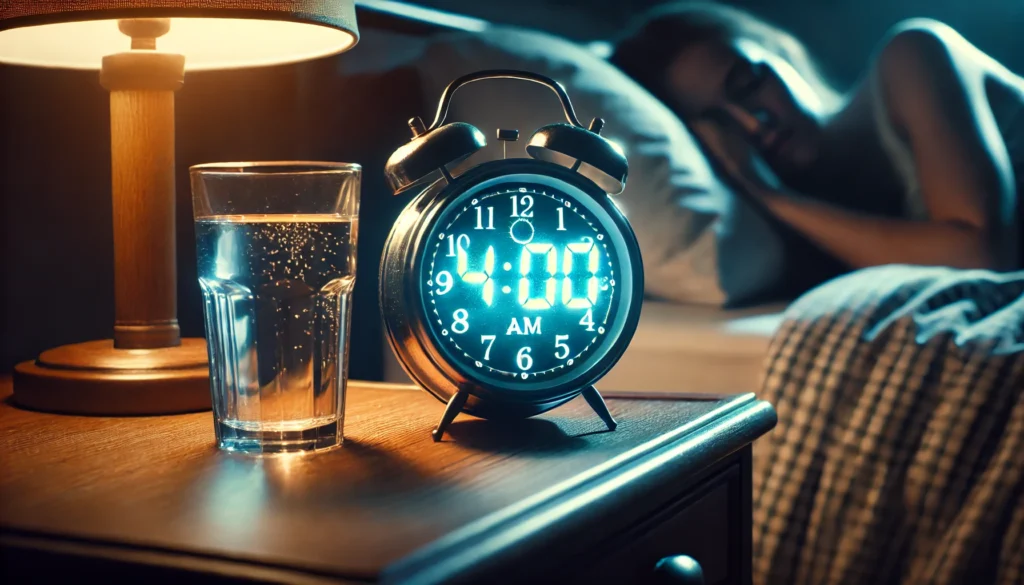Sleep is a vital part of our lives. It’s a time for our bodies to rest, rejuvenate, and prepare for the next day.
But how much sleep do we really need?
There’s a common belief that we need eight hours of sleep each night. However, some people claim they can function perfectly well on just four hours.
Is this really possible?
In this article, we’ll delve into the science of sleep. We’ll explore the myths and facts surrounding the concept of getting only four hours of sleep.
We’ll look at the potential effects on your health, both physical and mental. We’ll also discuss strategies for coping with limited sleep when necessary.
Whether you’re a health and wellness coach, a science journalist, or a biohacker, this comprehensive guide will provide you with the information you need.
Let’s debunk some myths and uncover the truth about four hours of sleep.
You May Also Like: Sleep Hygiene: Key Practices for Health
The Myth of the ‘Short Sleeper’
The idea of the ‘short sleeper’ is quite captivating. It suggests that some people need only four hours of sleep. This rare trait is often romanticized in stories of high achievers.
However, science tells a different story. Genuine short sleepers are exceptionally rare. Most people who sleep so little are often sleep-deprived, not naturally efficient.
Studies indicate that less than 1% of the population are true short sleepers. For most, four hours is insufficient for full biological recovery.
There’s a popular belief that short sleepers have a genetic mutation. This mutation, however, is not common and cannot be adopted by choice.
Consider the typical benefits that extend beyond just saving time:
- True short sleepers are alert and active with minimal sleep.
- Their health doesn’t suffer adverse effects from less sleep.
- They don’t rely on caffeine or stimulants to stay awake.
Most people simply cannot thrive on such limited rest. Attempting to do so leads to impaired cognitive function, weakened immunity, and more.
Before you assume you’re a short sleeper, review your health and productivity. Sleep is a fundamental necessity, not an option. It’s crucial to differentiate between true biological needs and self-imposed deprivation.

Understanding Sleep Cycles and Their Importance
Sleep is not just an overnight rest but a complex cycle. It consists of several stages, each with a specific function. These stages include light sleep, deep sleep, and REM (rapid eye movement) sleep. Together, they form a complete sleep cycle.
A typical sleep cycle lasts about 90 minutes. During a full night’s sleep, these cycles repeat multiple times. Each stage plays a role in physical recovery and brain health. For instance, deep sleep is crucial for muscle repair and immune function, while REM sleep supports memory and emotional regulation.
Missing out on a full sleep cycle can have serious consequences. Four hours of sleep means you might not complete enough cycles for optimal health. This can lead to poor concentration, mood swings, and overall decline in health. It’s not just about feeling sleepy; insufficient sleep impacts bodily functions on a deep level.
To better understand sleep cycles, consider their individual roles:
- Light Sleep: Acts as a transition from wakefulness to deeper stages, accounting for half of our sleep.
- Deep Sleep: Essential for physical recovery and growth, occurring mainly in the first few cycles.
- REM Sleep: Critical for learning, creativity, and memory processing, occurring more in later cycles.
Interruptions in these cycles can disrupt hormone balance, cognition, and mood. This explains why sleep isn’t just about quantity but also quality.
Achieving a balance of all sleep stages is fundamental to maintaining physical and mental health. It emphasizes why short sleep, such as four hours, is not sustainable for most people. Prioritizing complete cycles ensures body and mind are well-rested and prepared for daily challenges.
The Cognitive Cost of Sleep Deprivation
Sleep deprivation has profound effects on cognitive functions. Lack of sleep impairs attention, hindering your ability to concentrate and perform even simple tasks. This can result in errors at work or while driving, posing significant risks to safety.
Memory and learning are also compromised by insufficient sleep. During sleep, the brain processes and consolidates information gathered throughout the day. Four hours of sleep may not provide enough time for the brain to integrate new knowledge effectively. This is especially detrimental for students and professionals who rely on sharp mental acuity.
Decision-making capabilities suffer when sleep is restricted. People tend to make impulsive decisions without considering long-term consequences if they are deprived of adequate rest. This can affect both personal and professional life, leading to suboptimal outcomes and increased stress.
Additionally, creativity declines significantly with less sleep. The brain’s ability to form novel connections and generate creative solutions diminishes when deprived of rest. Many industries rely on innovation and creativity, and sleep deprivation can hinder performance in these areas. Hence, ensuring a full night’s sleep is key to maintaining a healthy, productive mind.
Physical Health and Sleep: Connecting the Dots
Sleep is crucial for maintaining physical health. Inadequate sleep can lead to various health problems, including weight gain. Studies suggest that lack of sleep disrupts hormones that regulate hunger, leading to increased appetite and calorie intake.
Cardiovascular health is also impacted by insufficient sleep. Four hours of sleep might not allow the body to adequately lower blood pressure and regulate heart rate, increasing the risk of heart disease over time. Consistently short sleep can strain the cardiovascular system.
Additionally, sleep supports metabolic health, including insulin sensitivity. Chronic sleep deprivation has been linked to an increased risk of developing type 2 diabetes. Proper sleep helps in the regulation of glucose levels, reducing the risk of diabetes.
Moreover, the immune system relies on sleep for optimal function. Sleep deprivation weakens the body’s defense mechanisms, making it more susceptible to infections. A full sleep cycle helps the body build and maintain a strong immune response. Thus, adequate sleep is an essential component of overall physical health, reinforcing the body’s ability to repair and rejuvenate.
Mental Health and the Sleep Deprivation Link
Sleep and mental health are closely intertwined. Sleep deprivation is known to exacerbate symptoms of mental health disorders, such as depression and anxiety. A lack of sleep can intensify feelings of irritability and stress.
Chronic insufficient sleep may contribute to the onset of mental health issues. Persistent sleep deprivation disrupts neurotransmitter balance, affecting mood and emotional regulation. Over time, this imbalance can lead to more serious mental health challenges.
For those already managing mental health conditions, sleep plays a pivotal role. Restorative sleep helps stabilize mood and improve coping mechanisms. Therapies that focus on improving sleep quality can significantly enhance treatment outcomes for conditions like anxiety and depression.
Moreover, sleep deprivation impairs cognitive functions, like attention and decision-making. The brain needs adequate rest to process and manage emotions effectively. Establishing a healthy sleep routine is vital for maintaining good mental health and fostering resilience against stressors.
Genetic Factors in Sleep Needs
Genetics significantly influence how much sleep each person needs. Some people naturally require more rest, while others thrive on less. Researchers have identified genetic variations linked to sleep duration and quality.
For instance, the DEC2 gene mutation allows some to function well on less sleep. However, this ‘short sleeper’ trait is rare. Most people need the standard recommendation of 7 to 9 hours of sleep per night.
It’s important to recognize that trying to emulate short sleepers can lead to health issues. Ignoring individual sleep needs can increase the risk of chronic illnesses. Understanding genetic factors can guide personalized approaches to sleep management, ensuring optimal health and function.
The Accumulating Sleep Debt
Sleep debt accumulates when you consistently get less sleep than needed. Even small deficits can add up over time, affecting overall health. This debt can impair physical and mental performance.
Chronic sleep deprivation leads to fatigue, reduced alertness, and poor decision-making. It can also increase stress, which exacerbates health issues. The longer the sleep debt persists, the more profound its effects.
Repaying sleep debt is not as simple as sleeping in on weekends. Catching up can take longer than a single weekend allows. It’s essential to prioritize sleep and make consistent lifestyle changes to manage and reduce sleep debt, ensuring long-term health and well-being.

Strategies for Coping with Limited Sleep
Functioning on limited sleep is a challenge, but strategic approaches can help. First, prioritize tasks. Focus on essential activities and postpone less important ones. Conserving energy for crucial tasks can improve effectiveness.
Stay hydrated and maintain a balanced diet. Proper nutrition boosts energy levels and supports brain function. Small, nutrient-rich meals throughout the day can prevent fatigue.
Incorporate short breaks and micro-naps. Brief periods of rest, even 10-20 minutes, can refresh the mind. This practice is especially useful for those who are chronically under-slept.
Here are additional strategies:
- Avoid heavy meals close to bedtime.
- Limit caffeine intake in the afternoon.
- Practice deep breathing for mental clarity.
- Use light exposure wisely to maintain alertness.
Biohacking Sleep Quality
Biohacking can optimize sleep quality when you can’t increase its duration. This approach involves using techniques and tools to enhance your sleep environment. One key focus is on minimizing blue light exposure before bed.
Utilizing apps that adjust screen color can aid in this. These apps reduce blue light that disrupts melatonin production. Melatonin helps regulate sleep-wake cycles.
Certain supplements like melatonin or magnesium may also help enhance sleep quality. However, it’s essential to consult with a healthcare provider before starting any new supplements. Personalized biohacking strategies cater to individual needs, emphasizing the uniqueness of each person’s sleep patterns.
Sleep Hygiene: Best Practices
Good sleep hygiene improves sleep quality. It involves creating conducive conditions and behaviors for restful sleep. Establishing a relaxing nighttime routine can be beneficial.
Maintain a consistent sleep schedule. Going to bed and waking up at the same time helps regulate your body clock. A regular schedule reinforces the body’s natural sleep-wake cycle.
Limit stimulating activities before bed. Here are some effective sleep hygiene tips:
- Keep the bedroom dark, cool, and quiet.
- Avoid screens at least one hour before bedtime.
- Engage in relaxing activities, like reading or bathing.
- Invest in a comfortable mattress and pillows.
Implementing these practices makes a significant difference, ensuring quality sleep is achieved even when limited.
The Role of Diet, Exercise, and Lifestyle in Sleep
Diet, exercise, and lifestyle significantly affect sleep quality and duration. Consuming a balanced diet is vital for a good night’s sleep. Foods rich in tryptophan, magnesium, and vitamin B6, such as turkey, nuts, and bananas, can promote relaxation and sleep.
Regular exercise is also essential for healthy sleep patterns. Engaging in physical activities during the day can lead to longer, more restorative sleep. However, try to complete workouts a few hours before bedtime to avoid stimulating your body right before sleep.
Lifestyle habits, such as maintaining a consistent sleep routine and reducing exposure to screens before bed, are crucial. Additionally, creating a calming bedtime ritual can signal the body that it’s time to wind down. By integrating healthy eating, regular physical activity, and mindful lifestyle choices, one can significantly improve sleep quality and overall well-being.
The Dangers of Stimulants and Sleep Deprivation
Using stimulants to counteract sleep deprivation can be a slippery slope. While caffeine and energy drinks might provide a temporary energy boost, they often interfere with natural sleep cycles. This interference can lead to a vicious cycle of sleep disruption.
Reliance on stimulants can mask the body’s natural signals that more rest is needed. This masking can cause extended periods of sleep deprivation, further exacerbating cognitive and physical impairments. Over time, this can significantly impair immune function and stress management.
Sleep deprivation coupled with stimulant use can also elevate heart rate and blood pressure. Elevated stress hormones, like cortisol, are often found in sleep-deprived individuals, leading to potential long-term health risks. Consequently, it’s crucial to address sleep issues directly rather than relying on temporary, possibly harmful, fixes.
Can You ‘Catch Up’ on Sleep?
The idea of catching up on sleep is popular, but it’s more myth than fact. While it’s possible to recover from a short-term sleep debt, chronic sleep deficiency isn’t as easily reversed. Sleeping in on weekends might feel refreshing, but it doesn’t truly compensate for lost sleep.
Sleep has a cumulative effect on overall health. Regularly missing sleep affects cognitive performance, mood, and physical health. Attempting to catch up can throw your body’s internal clock off balance, making it harder to maintain consistent sleep.
A consistent sleep schedule is crucial for good health. It’s better to prioritize consistent, adequate sleep every night. Ensuring regular sleep helps maintain circadian rhythms, enhances mood, and supports immune function. Instead of trying to catch up, aim to establish healthy, sustainable sleep habits.
The Impact of Technology on Sleep
Technology is an integral part of modern life but can disrupt sleep. The blue light emitted from screens interferes with the body’s production of melatonin, a hormone crucial for sleep. This can make it harder to fall asleep and stay asleep.
Nighttime screen use is a common habit that can affect sleep quality. Watching TV, scrolling through social media, or working late on a laptop can delay sleep onset. This pattern leads to reduced overall sleep time and poorer sleep efficiency.
To mitigate these effects, it’s important to develop new habits. Consider reducing screen time at least an hour before bed. Utilize night mode features on devices to minimize blue light exposure. Establishing a tech-free wind-down routine can help support healthier sleep patterns and improve overall restfulness.

Conclusion: Embracing Healthy Sleep Habits
To prioritize sleep, we must start by understanding its role in overall health. Adequate sleep is essential for mental acuity, emotional balance, and physical well-being. It allows the body to repair and rejuvenate, preparing you for the next day’s challenges.
Adopting healthy sleep habits can significantly impact quality of life. Establish a consistent sleep schedule, creating a stable routine that aligns with your natural circadian rhythms. Such consistency facilitates easier sleep onset and deeper, more restorative rest.
Mindfulness about daily habits that affect sleep is crucial. Limiting caffeine, creating a calming bedtime routine, and optimizing your sleep environment can support better rest. By investing in quality sleep, you set the foundation for optimal health and enhanced productivity. Embrace these practices to improve not just sleep quality but overall well-being.
Further Reading:
BBC: The myth of the eight-hour sleep
Sleep Number: Can 4 Hours of Sleep a Night Be Healthy?
Sleep Foundation: Is 5 Hours of Sleep Enough?
Important Note: The information contained in this article is for general informational purposes only, and should not be construed as health or medical advice, nor is it intended to diagnose, prevent, treat, or cure any disease or health condition. Before embarking on any diet, fitness regimen, or program of nutritional supplementation, it is advisable to consult your healthcare professional in order to determine its safety and probable efficacy in terms of your individual state of health.
Regarding Nutritional Supplements Or Other Non-Prescription Health Products: If any nutritional supplements or other non-prescription health products are mentioned in the foregoing article, any claims or statements made about them have not been evaluated by the U.S. Food and Drug Administration, and such nutritional supplements or other health products are not intended to diagnose, treat, cure, or prevent any disease.


